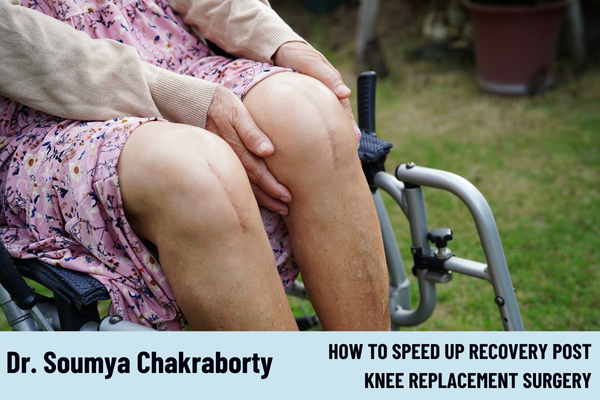Knee replacement surgery is a life-changing procedure for individuals suffering from chronic knee pain and limited mobility due to arthritis or injury. While the surgery itself is crucial, the recovery process plays a vital role in ensuring the long-term success of the procedure. Dr. Soumya Chakraborty, one of Kolkata’s leading orthopedic surgeons, shares key tips to speed up recovery post-knee replacement surgery.
1. Follow Your Doctor’s Post-Op Instructions
After knee replacement surgery, it’s essential to follow your surgeon’s guidelines meticulously. This includes taking prescribed medications, caring for the surgical wound, and attending follow-up appointments. Dr. Chakraborty emphasizes that sticking to these instructions reduces the risk of complications, like infections or blood clots, and ensures a smoother recovery.
2. Engage in Physical Therapy
Physical therapy is a cornerstone of knee replacement recovery. Your therapist will introduce exercises that help restore strength, flexibility, and range of motion to the knee. Starting therapy early and continuing diligently can significantly accelerate your healing.
Pro tip: Engage in exercises like heel slides, straight leg raises, and knee bends. Remember, consistency is key to regaining mobility and reducing stiffness.
3. Stay Active—But Don’t Overdo It
While physical activity is essential, avoid overexerting yourself. Gradually increasing your activity levels helps the knee heal without causing strain. Walking, using a stationary bike, and light swimming are great low-impact exercises that promote healing without putting undue stress on the new joint.
Dr. Chakraborty advises listening to your body—rest when needed but aim to stay active throughout the day to maintain circulation and prevent stiffness.
4. Use Assistive Devices
Using crutches or walkers after surgery helps you move around safely without putting too much pressure on your knee. Don’t rush to stop using these devices—ensure that you have adequate balance and strength in your knee before transitioning to full mobility.
5. Focus on Nutrition
Good nutrition speeds up recovery by providing your body with the nutrients it needs to heal. Dr. Chakraborty recommends a diet rich in:
- Proteins to promote tissue repair
- Vitamins C and D to boost immune function and bone health
- Omega-3 fatty acids to reduce inflammation
Staying hydrated is also critical, as it helps maintain joint flexibility and reduces swelling.
6. Manage Pain Effectively
Proper pain management allows you to move comfortably and engage in physical therapy without hesitation. Take pain medications as prescribed, and use ice packs to reduce swelling and numb the area.
Pro tip: Applying ice packs for 15–20 minutes several times a day during the early recovery phase can help reduce pain and inflammation.
7. Prioritize Rest and Sleep
Rest is crucial for the healing process. Ensure you’re getting enough sleep each night to allow your body to repair tissues. Elevate your leg while resting to reduce swelling and improve blood circulation.
8. Watch for Signs of Complications
While rare, complications such as infections or blood clots can delay recovery. Be vigilant about symptoms like fever, excessive swelling, or pain in your leg. If any of these symptoms appear, contact your surgeon immediately.
Conclusion
A successful recovery after knee replacement surgery requires a balanced approach involving physical therapy, proper pain management, healthy eating, and rest. By following these strategies, you can speed up your recovery and return to a more active, pain-free life. For expert care and personalized advice, consult with Dr. Soumya Chakraborty, one of the best orthopedic surgeons in Kolkata.

